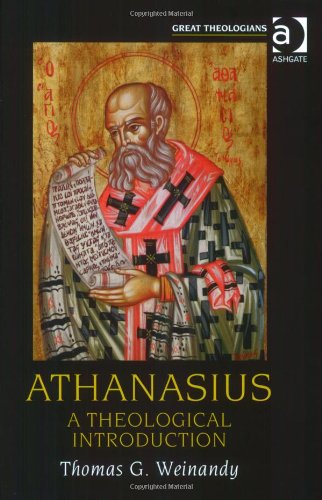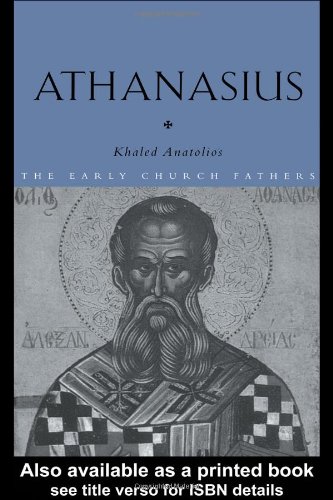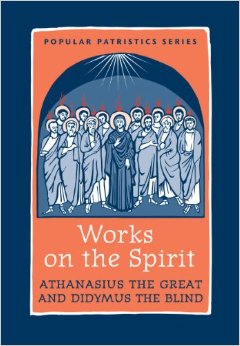|
Relevant
books available at Amazon
Many Athanasius
studies
and translations with links to Amazon
--------------
STUDIES (Click on images below.)
 
Athanasius of Alexandria
David M. Gwynn --------------
 
Athanasius
Peter J. Leithart --------------
 
Athanasius: A Theological Introduction
Thomas G. Weinandy --------------
TRANSLATIONS
 
Athanasius
Khaled Anatolios --------------
 
On the Incarnation
John Behr --------------
 
Works on the Spirit
Mark DelCogliano et al. --------------
 
The Life of Antony and the Letter to Marcellinus
R. C. Gregg -------------- |
3. The ‘Meletians’ to be acknowledged, and all who renounce
heresy, especially as to the Holy Spirit.
As many then as desire peace with us, and specially those who assemble in the
Old [Church] and those again who are seceding from the Arians, do ye call to
yourselves, and receive them as parents their sons, and welcome them as tutors
and guardians; and unite them to our beloved Paulinus and his people, without
requiring more from them than to anathematise the Arian heresy and confess the
faith confessed by the holy fathers at Nicæa, and to anathematise also those who
say that the Holy Spirit is a Creature and separate from the Essence of Christ.
For this is in truth a complete renunciation of the abominable heresy of the
Arians, to refuse to divide the Holy Trinity, or to say that any part of it is a
creature. For those who, while pretending to cite the faith confessed at Nicæa,
venture to blaspheme the Holy Spirit, do nothing more than in words deny the
Arian heresy while they retain it in thought. But let the impiety of Sabellius
and of Paul of Samosata also be anathematised by all, and the madness of
Valentinian and Basilides, and the folly of the Manichæans. For if this be done,
all evil suspicion will be removed on all hands, and the faith of the Catholic
Church alone be exhibited in purity.
4. The parties at Antioch to unite.
But that we, and they who have ever remained in communion with us, hold this
faith, we think no one of yourselves nor any one else is ignorant. But since we
rejoice with all those who desire re-union, but especially with those that
assemble in the Old [church], and as we glorify the Lord exceedingly, as for all
things so especially for the good purpose of these men, we exhort you that
concord be established with them on these terms, and, as we said above, without
further conditions, without namely any further demand upon yourselves on the
part of those who assemble in the Old [church], or Paulinus and his fellows
propounding anything else, or aught beyond the Nicene definition.
5. The creed of Sardica not an authorised formula. Question of ‘hypostasis.’
And prohibit even the reading or publication of the paper, much talked of by
some, as having been drawn up concerning the Faith at the synod of Sardica. For
the synod made no definition of the kind. For whereas some demanded, on the
ground that the Nicene synod was defective, the drafting of a creed, and in
their haste even attempted it, the holy synod assembled in Sardica was
indignant, and decreed that no statement of faith should be drafted, but that
they should be content with the Faith confessed by the fathers at Nicæa,
inasmuch as it lacked nothing but was full of piety, and that it was undesirable
for a second creed to be promulged, lest that drafted at Nicæa should be deemed
imperfect, and a pretext be given to those who were often wishing to draft and
define a creed. So that if a man propound the above or any other paper, stop
them, and persuade them rather to keep the peace. For in such men we perceive no
motive save only contentiousness. For as to those whom some were blaming for
speaking of three Subsistences, on the ground that the phrase is unscriptural
and therefore suspicious, we thought it right indeed to require nothing beyond
the confession of Nicæa, but on account of the contention we made enquiry of
them, whether they meant, like the Arian madmen, subsistences foreign and
strange, and alien in essence from one another, and that each Subsistence was
divided apart by itself, as is the case with creatures in general and in
particular with those begotten of men, or like different substances, such as
gold, silver, or brass;—or whether, like other heretics, they meant three
Beginnings and three Gods, by speaking of three Subsistences.
They assured us in reply that they neither meant this nor had ever held it. But
upon our asking them ‘what then do you mean by it, or why do you use such
expressions?’ they replied, Because they believed in a Holy Trinity, not a
trinity in name only, but existing and subsisting in truth, ‘both a Father truly
existing and subsisting, and a Son truly substantial and subsisting, and a Holy
Spirit subsisting and really existing do we acknowledge,’ and that neither had
they said there were three Gods or three beginnings, nor would they at all
tolerate such as said or held so, but that they acknowledged a Holy Trinity but
One Godhead, and one Beginning, and that the Son is coessential with the Father,
as the fathers said; while the Holy Spirit is not a creature, nor external, but
proper to and inseparable from the Essence of the Father and the Son.
6. The question of one Subsistence (Hypostasis) or three, not to be pressed.
Having accepted then these men’s interpretation and defence of their language,
we made enquiry of those blamed by them for speaking of One Subsistence, whether
they use the expression in the sense of Sabellius, to the negation of the Son
and the Holy Spirit, or as though the Son were non-substantial, or the Holy
Spirit impersonal. But they in their turn assured us that they neither meant
this nor had ever held it, but ‘we use the word Subsistence thinking it the same
thing to say Subsistence or Essence;’ ‘But we hold that there is One, because
the Son is of the Essence of the Father, and because of the identity of nature.
For we believe that there is one Godhead, and that it has one nature, and not
that there is one nature of the Father, from which that of the Son and of the
Holy Spirit are distinct.’ Well, thereupon they who had been blamed for saying
there were three Subsistences agreed with the others, while those who had spoken
of One Essence, also confessed the doctrine of the former as interpreted by
them. And by both sides Arius was anathematised as an adversary of Christ, and
Sabellius, and Paul of Samosata, as impious men, and Valentinus and Basilides as
aliens from the truth, and Manichæus as an inventor of mischief. And all, by
God’s grace, and after the above explanations, agree together that the faith
confessed by the fathers at Nicæa is better than the said phrases, and that for
the future they would prefer to be content to use its language.
7. The human Nature of Christ complete, not Body only.
But since also certain seemed to be contending together concerning the fleshly
Economy of the Saviour, we enquired of both parties. And what the one confessed,
the others also agreed to, that the Word did not, as it came to the prophets, so
dwell in a holy man at the consummation of the ages, but that the Word Himself
was made flesh, and being in the Form of God, took the form of a servant, and
from Mary after the flesh became man for us, and that thus in Him the human race
is perfectly and wholly delivered from sin and quickened from the dead, and
given access to the kingdom of the heavens. For they confessed also that the
Saviour had not a body without a soul, nor without sense or intelligence; for it
was not possible, when the Lord had become man for us, that His body should be
without intelligence: nor was the salvation effected in the Word Himself a
salvation of body only, but of soul also. And being Son of God in truth, He
became also Son of Man, and being God’s Only-begotten Son, He became also at the
same time ‘firstborn among many brethren.’ Wherefore neither was there one Son
of God before Abraham, another after Abraham: nor was there one that raised up
Lazarus, another that asked concerning him; but the same it was that said as
man, ‘Where does Lazarus lie;’ and as God raised him up: the same that as man
and in the body spat, but divinely as Son of God opened the eyes of the man
blind from his birth; and while, as Peter says, in the flesh He suffered, as God
opened the tomb and raised the dead. For which reasons, thus understanding all
that is said in the Gospel, they assured us that they held the same truth about
the Word’s Incarnation and becoming Man.
|

